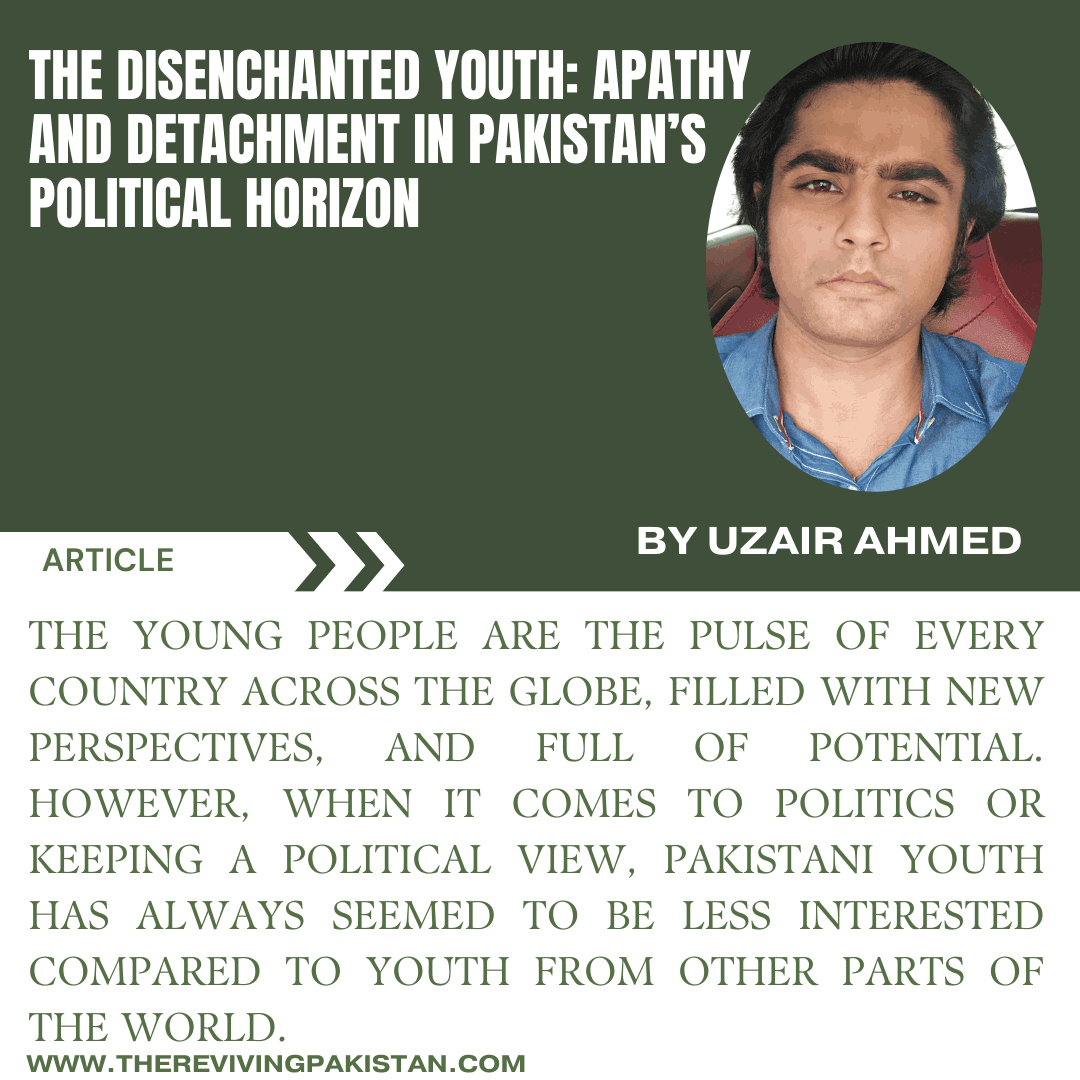About the Author(s)

Uzair Ahmad
The author is a student of international relations at DHA Suffa University, aiming to address socio-political issues domestically and internationally through the platform of writing.
The young people are the pulse of every country across the globe, filled with new perspectives, and full of potential. However, when it comes to politics or keeping a political view, Pakistani youth has always seemed to be less interested compared to youth from other parts of the world. Youth in Pakistan are turning disenchanted and opting out of a system they view as bogus and desensitized to their concerns. Pakistan is one of the largest demographic groups, with around 64% of the total population below the age of 30, this is as per the United Nations Development Program’s (UNDP) National Human Development Survey. And the major portion of it became indifferent towards politics.
On the other hand, there is an argument that the youth intrinsically shows a lack of interest towards politics. Conversely, this isn’t merely a matter of lack of interest rather it is a deep-rooted disillusionment with a political system that has systematically failed to deliver on its promises. From permeative corruption scandals to chronic economic mismanagement. Consequently, the youth is either leaving the country to settle abroad to have a better life or living in the country by being completely disconnected from political affairs or politics itself. There’s a ‘cycle of apathy’ created among the youth with this growing disenchantment. This further marginalizes their concerns and leads to even more disenchantment. However, this apathy is not a silent secession, it is a loud indictment of the political establishment.
The role of social media is also very contemplative, it was once acclaimed as a tool for youth empowerment but has become a mixed blessing. It allows for the rapid spread of information and mobilization, but at the same time, it amplifies disillusionment. The constant bombardment of disinformation, false propaganda, political scandals, and simultaneously unfulfilled promises reinforces the narrative that politics is a corrupt, malicious and futile endeavour, and that no young mind should enter into it, as a result of this, the large population of youth becomes alienated to the political system. A relevant and current example of a student-led young movement in Bangladesh. From 2018 ‘Road Safety Movement’ after two students were killed by a speeding bus in Dhaka. A massive protest erupted against the authorities, and the culprits were held accountable, till this time, the recent protests against an autocratic regime over a government job quota system which was based on the descendants of “Freedom Fighters.” By the time, the ratio was set up to more than 30%, a significant amount of government jobs was disproportionately allocated to the elite class.
In response to this, the youth went against all odds, following crackdowns, arrests, and labels such as traitors, and foreign agents. According to various credible sources, 350 casualties took place. Now the question arises what made them do all this? In my opinion, there are two factors which play an integral part in the case of Bangladesh. Firstly, they have ethnic homogeneity, which creates unity, a sense of belonging, common interests and common issues. Secondly, the political acumen that the youth possess. While youth in Pakistan lack these two factors. I think to rekindle the engagement of youth in politics, political parties must create a space for the youth to actively participate in the political system as well as in the decision-making processes.
Further, civil society organizations have a vital role to play in taking part with schools and universities to educate young people about the importance of exposing themselves to politics, and inevitably the government should revive student unions (which was banned under the military dictatorship of General Zia) to provide youth a suitable platform to express their views and be a part of local politics. Moreover, the current curricula of schools and universities should incorporate civic education in it, to ensure that young Pakistanis understand the core value of their participation in the political process.
In summary, as I said young people are the pulse of every country. A country comprising 64% population of youth, yet incapable of extracting potential from them and using it efficiently. Youth has always been a mammoth asset for countries to make progress. Thus, if Pakistan needs to progress, its youth have to be actively engaged in the political system and along with that a collective effort with consensus by politicians, civil society, and other state institutions needs to be taken to uplift youth by inducing a political horizon where their voices can be heard.
References:
1.https://www.dawn.com/news/1831567
2. https://www.npr.org/2024/08/16/g-s1-17112/bangladesh-students-protests-gen-z-newgovernment
3.https://www.gcu.edu.pk/pages/gcupress/pjscp/volumes/pjscp2012april-10.pdf

